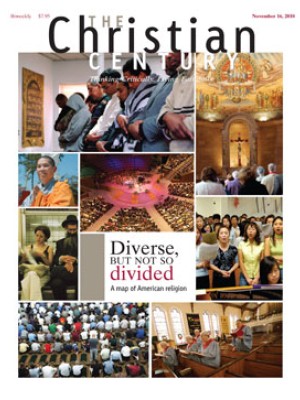Sunday, November 21, 2010
Fifty years ago, when I was growing up as Mennonite farm girl in central Illinois, I had Catholic playmates, but we never went to each other's churches. I could not have imagined that an international Catholic-Mennonite dialogue would take place between 1998 and 2003. Twenty-five years ago, when I was discerning a call to teach New Testament at a denominational seminary in northern Indiana, I still could not have imagined such a dialogue. Ten years ago, when I was beginning a sabbatical at St. John's Abbey in Minnesota and my first foray into the hospitable space of Benedictine spirituality, the international dialogue had moved from imagination into reality. But Rome was far away, and I could not imagine that this dialogue might change my life.
Yet a few weeks ago I was one of the Mennonite respondents at a Catholic-Mennonite day of reflection in South Bend, Indiana. Together we were studying a new letter jointly drafted by Mennonite and Catholic members of the international dialogue and addressed to the World Council of Churches' Decade to Overcome Violence. It is a remarkable document in many ways, not least because it states that "we affirm Jesus' teaching and example on nonviolence as normative for Christians." As we gathered that Saturday morning at St. Matthew's Cathedral, speaker after speaker noted that not only the letter we were discussing but also the friendships that had taken hold among us seemed nothing short of miraculous.
Read our latest issue or browse back issues.
For me, it is the Benedictus, Zechariah's song after the birth of his son in Luke 1:68–79, that throbs beneath, floats above and measures the cadences at the heart of what it means to be a Christian who participates in ecumenical conversation and an American who lives in a time of war. It was at the abbey, when I was praying the morning office with the monks, that the Benedictus began its slow work of formation in my life. It is with the Anabaptist Prayer Book (Take Our Moments and Our Days, Vol. 1: Ordinary Time), inconceivable apart from Catholic-Mennonite friendship, that the Benedictus continues to sustain me.
This hymn expresses the rigorous hope that permeates the stories of the birth of two babies in the first part of Luke. The noun salvation occurs three times in this passage and then not again in the Gospel until the story of Zacchaeus in chapter 19. In the birth of John and the One for whom John will prepare the people, Zechariah perceives that God has visited and "made a redemption" for the people of God. God has raised up a horn of salvation, saved the people from their enemies, performed the mercy promised to the ancestors and remembered the holy covenant. In the mouth of Zechariah, the words of praise and piety become a hymn of fulfillment.
Nor should we overlook the transformation of Zechariah himself as a harbinger of the hope that he proclaims. In the opening verses of Luke 1, Zechariah's response to the message of his holy visitor is a lack of belief that results in him being silenced for the term of Elizabeth's pregnancy. We do not know what happened in Zechariah's mind and heart during those nine long months. We do know that now, on the day of the baby's circumcision, he is filled with the Spirit and able to speak with joyous and exuberant faith.
But the Benedictus does not stand alone in the Gospel of Luke. It mirrors a text of lamentation. There is a strong resonance of language between Zechariah's song and Jesus' tears as he weeps over Jerusalem in 19:41–44. Zechariah proclaims that the Lord God of Israel has visited and redeemed the people of Israel. He characterizes the mission of his son as preparation for the day when "the dawn will break on us from on high." This "day" will give light to those who sit in darkness, and it will guide our feet into the way of peace.
In Jesus' lament over Jerusalem in chapter 19, however, the city does not know the "things that make for peace." The people do not recognize the time of their visitation. The day is not a day of light but a day of destruction. For Luke, the tragedy of the human dilemma is that people choose to ignore, resist and reject the messengers that God sends them and that they harden their hearts toward the visitor who brings peace from God.
It is hope and lament that has brought some peace-minded Catholics and some sacramentally minded Mennonites together as what we call "Bridgefolk" after nearly 500 years of distrust—our hope in the God of peace who visits us still and our lament that human brokenness continues as tribe wars against tribe and nation against nation. The technology that allows instant access to people across the globe has not discernibly helped us deal with our fear and distrust of the other. Postmodern relativism, despite its rhetoric of promise, has not measurably increased tolerance in the world. Increasingly we ask what it means to live as Christians in this post-Christian time, in a world that's endangered.
For the healing we need, we cannot do better than to rely on the ancient assurances of Zechariah's hymn. Written in a time of occupation and economic disarray that eclipses our own in its uncertainty, the hymn proclaims that we are indeed free, whatever our brokenness, to worship God without fear. As Bridgefolk attest, it is in worshiping together without fear that we find our way to sturdy and life-giving friendship.





